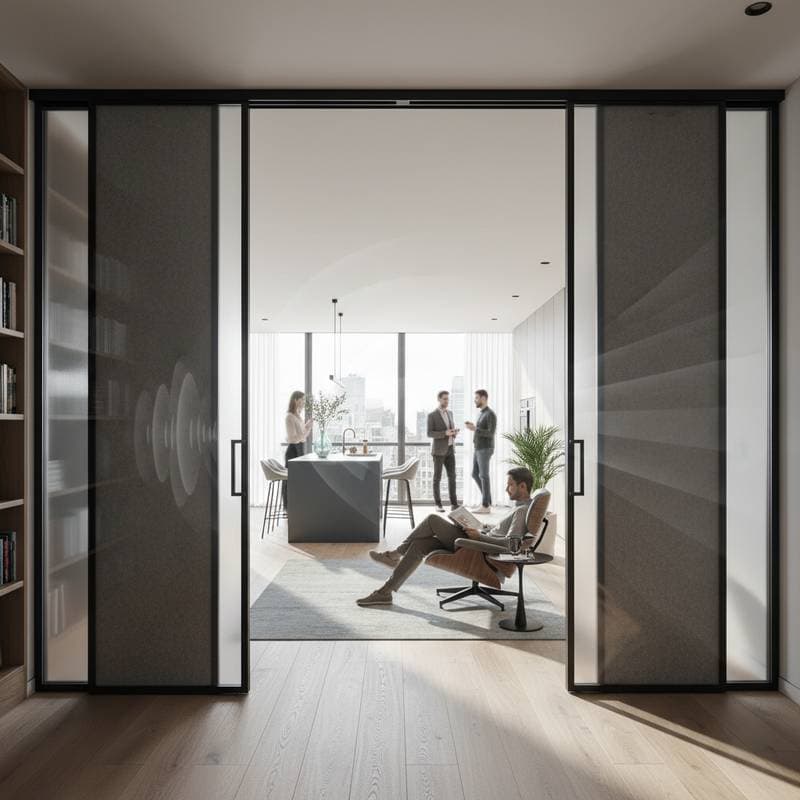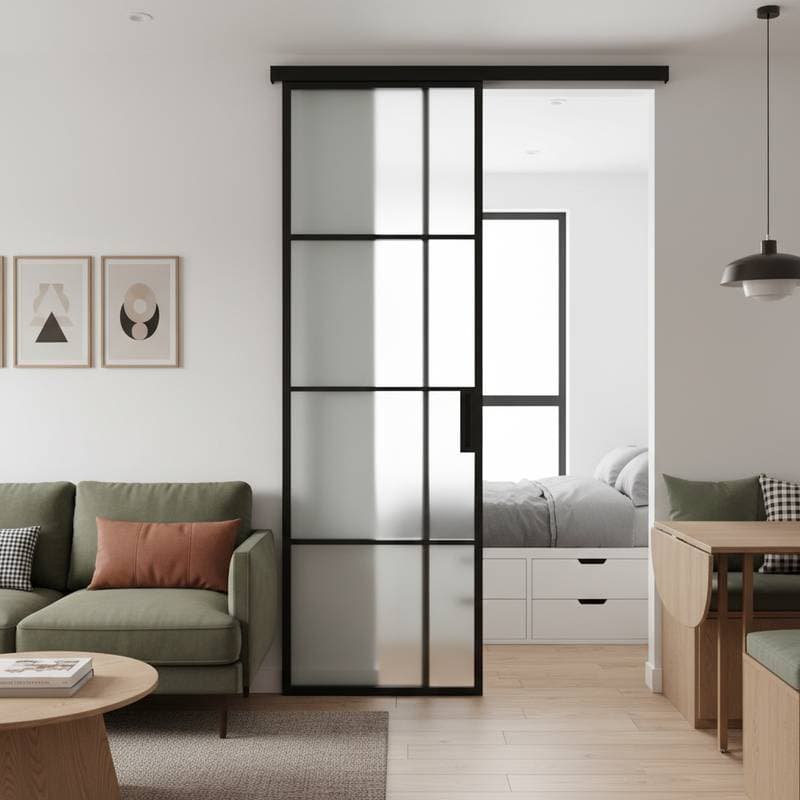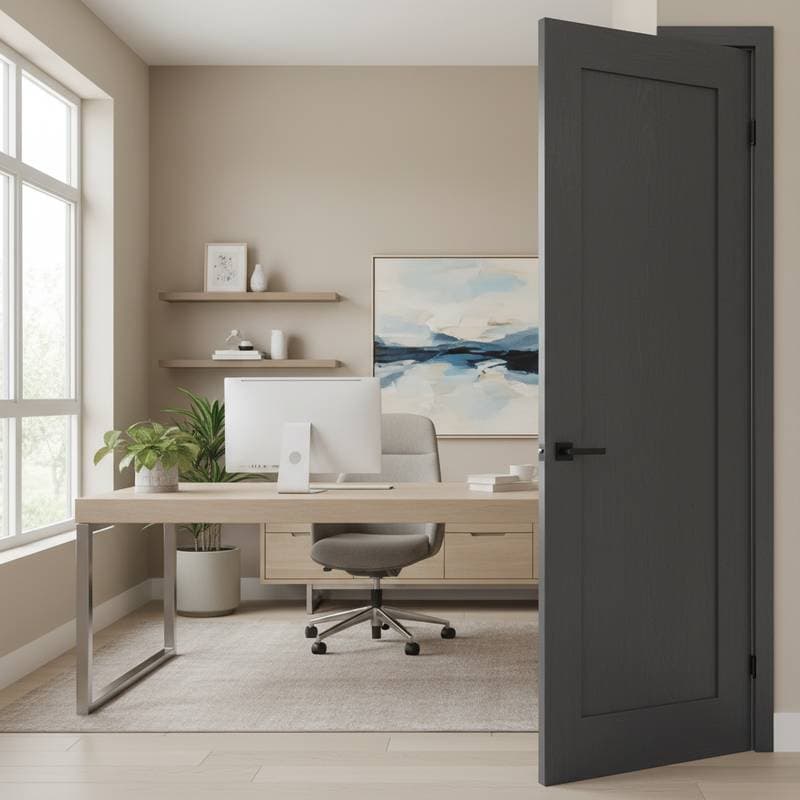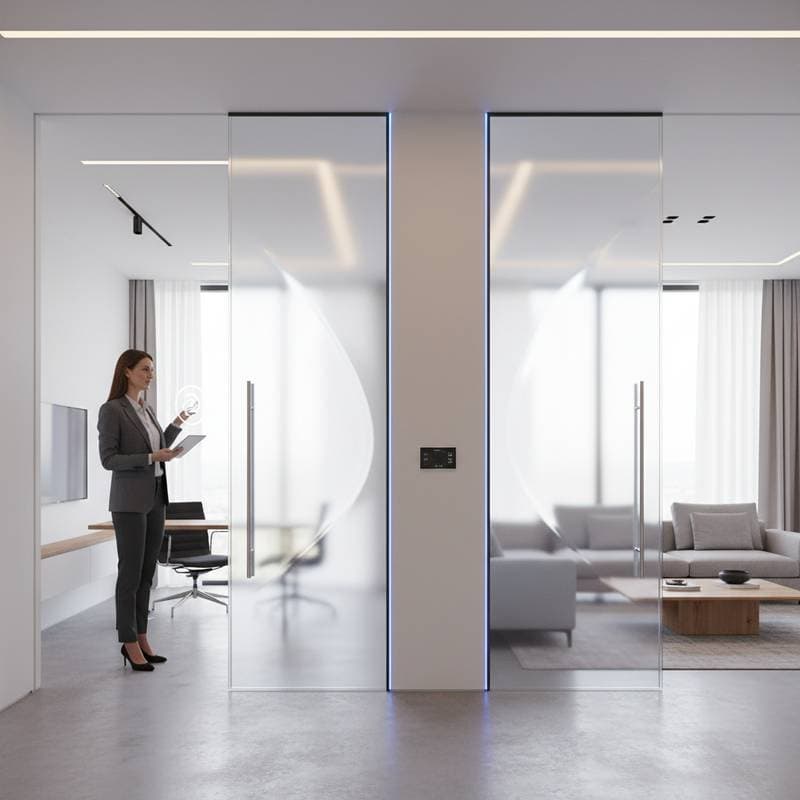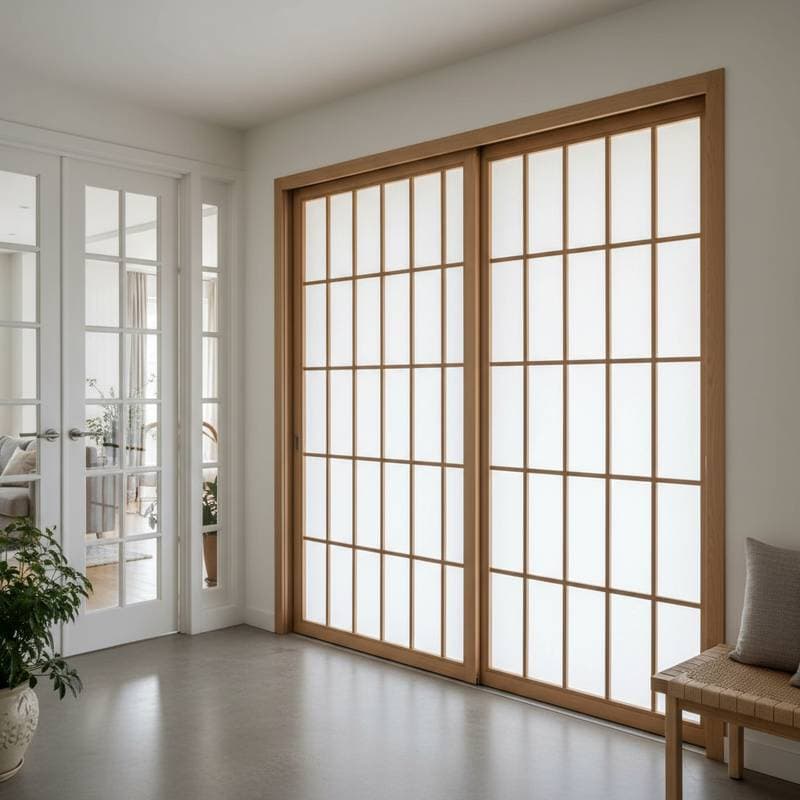Acoustic Sliding Doors: Quiet Luxury for Modern Living
Open floor plans and hard-surface materials have intensified noise issues in contemporary residences. Acoustic sliding doors address this challenge by blocking intrusive sounds while preserving a streamlined, space-efficient appearance. These doors integrate customized acoustic performance with elevated design elements, fostering serene interiors without forgoing aesthetic appeal. They suit separations between home offices, entertainment areas, or sleeping quarters and high-traffic zones, yielding a more tranquil and polished atmosphere.
Three Approaches to Achieve This Design
Budget Option ($900 - $1,800)
- Select composite-core sliding doors equipped with acoustic seals.
- Seek MDF or engineered wood panels featuring a moderate sound transmission class (STC) rating of 30 to 35.
- Incorporate felt or rubber gaskets along the frame edges to minimize sound leakage.
- Retain current tracks and substitute only the door panels for a cost-effective enhancement.
- Allocate funds toward durable track hardware that supports silent, fluid gliding.
Mid-Range Option ($1,800 - $3,200)
- Advance to solid-core wood doors incorporating built-in acoustic dampening layers.
- Install double-track configurations that enable panel overlap for superior sound isolation.
- Integrate laminated glass inserts with acoustic interlayers to permit light passage while curbing noise transfer.
- Equip with soft-close features to eliminate abrupt closures.
- Choose complementary trim elements for a seamless, integrated architectural effect.
Premium Option ($3,200 - $6,500)
- Choose engineered acoustic sliding systems constructed with multiple layers and STC ratings exceeding 40.
- Feature hidden tracks, comprehensive perimeter seals, and automatic drop-bottom gaskets.
- Select high-end materials like walnut veneer, oak solids, or thermally fused laminates accented with metal.
- Incorporate specialized acoustic glazing for balanced visibility and seclusion.
- Engage certified installers to guarantee precise alignment and optimal soundproofing efficacy.
Guide to Materials and Finishes
For windows adjacent to sliding door installations, employ double or triple glazing to sustain uniform noise control. Opt for black or bronze frames to evoke a modern vibe, or select natural wood shades for inviting warmth and harmony.
Solid-core doors establish the benchmark for effective sound attenuation. Surface treatments in matte oak, ash, or crisp white paint deliver enduring elegance. To infuse a contemporary flair, combine acoustic glass panels with powder-coated aluminum framing.
When extending soundproofing to outer walls, fiber cement or insulated vinyl siding enhances noise absorption. Patterns such as smooth lap siding or board-and-batten styles align with the precise contours of acoustic sliding doors.
For trim and accents, apply coordinating casing and baseboards in subtle, low-sheen varnishes. Hardware in brushed nickel or matte black provides a fresh, unified touch without excess ornamentation.
Essential Maintenance Practices
Acoustic sliding doors demand regular upkeep to sustain their sound-blocking capabilities. Clear track rollers of dust and particles quarterly to avoid irregular motion or openings that permit noise infiltration. Wipe glass surfaces using gentle, non-abrasive solutions to retain transparency.
For wood or veneer elements, apply a solution of mild soap and water, then dry with a soft cloth. Inspect seals biannually for degradation, particularly in moist environments, and replace any that have hardened. This routine preserves both visual appeal and acoustic integrity over extended periods.
Common Pitfalls to Sidestep
- Neglecting Frame Seals: Superior doors underperform without proper edging. Prioritize acoustic-rated seals or drop seals around the entire perimeter.
- Skimping on Setup: Crooked tracks or irregular frames undermine isolation. Hire professionals to secure complete seal engagement with adjoining surfaces.
- Disregarding Visual Harmony: Uniform finishes across doors, trim, and fixtures project deliberate design rather than disjointed additions.
- Selecting Inadequate Glass: Ordinary panes conduct sound readily. Mandate laminated or specialized acoustic glass for designs requiring see-through elements.
Harmonizing Colors and Styles
Pair acoustic sliding doors with palettes that amplify calm and refinement for unified interiors.
- Soft White + Natural Oak + Brushed Nickel: Serene and luminous, fitting for Scandinavian or transitional environments.
- Matte Black + Warm Walnut + Clear Glass: Bold and striking, ideal for modern or industrial settings.
- Coastal Gray + Whitewashed Pine + Polished Chrome: Breezy and casual, suited to coastal contemporary dwellings.
- Charcoal + Ash + Aged Brass: Deep and atmospheric, enriching minimalist compositions.
A palette attuned to the home's architecture averts visual discord as the door neutralizes auditory disturbances.
Steps for Your Soundproofing Initiative
Prior to selecting an acoustic sliding door, record existing conditions and objectives. This groundwork aligns choices with specific requirements and financial limits.
Checklist for Homeowners:
- Photographs: Record the space from multiple perspectives, including trim, floors, and illumination.
- Architectural Characteristics: Identify key features like molding shapes or window treatments to inform finish decisions.
- Noise Origins: Pinpoint sources as internal or external to the residence.
- Local Conditions: Evaluate humidity levels, temperature variations, or coastal influences on material durability.
- Financial Focus: Identify spending priorities for peak acoustic and visual benefits.
Armed with this information, refine searches to match targeted performance and stylistic goals.
Integrating Elements for Lasting Impact
Acoustic sliding doors unite efficacy and sophistication, providing noise reduction absent cumbersome alterations. They adapt seamlessly to expansive layouts, compact areas, and current remodels where traditional doors prove obtrusive. Single panels or multi-track arrays alike produce calmer, more versatile living spaces.
Effective soundproofing now enhances rather than detracts from design. Through deliberate material selection, finish coordination, and color schemes, these doors boost both ease and allure. Strategic planning, expert fitting, and periodic care enable noise cuts of up to 85 percent, while refining the overall residential aesthetic.

